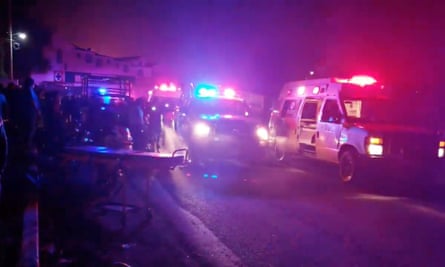The death toll from the explosion of a pipeline ruptured by suspected fuel thieves in central Mexico has risen to 73, the governor of the state of Hidalgo has said.
At a news conference with the Mexican president, Andrés Manuel López Obrador, the governor, Omar Fayad, said 76 people had also been injured in Friday evening’s explosion, which happened as people tried to fill containers with fuel.
Dozens of burned bodies lay in the charred field where the blast occurred in the municipality of Tlahuelilpan as forensic experts inspected and photographed the remains. Soldiers and other military personnel surrounded the cordoned-off area.
López Obrador pledged to step up his government’s drive to stamp out fuel theft, which has cost the country billions of dollars in the last few years.
Video footage showed people getting covered in petrol as they tried to fill their containers on Friday. Screams could be heard later as a fireball shot into the sky. “Hit the ground,” one person yelled at those fleeing.
The origins of the explosion remain uncertain, but it brought home the horrors of stolen fuel, often siphoned from pipes belonging to the state-run oil company, Pemex.
"Mi garrafón, wey" circula en redes video de la fuga en #Tlahuelilpan, Hidalgo antes de la explosión https://t.co/LoGFExj8cH pic.twitter.com/wCOP5XQv4a
— La Silla Rota (@lasillarota) January 19, 2019
Fayad appealed to people via Twitter to avoid taking fuel, saying they were putting their lives and those of their families at risk. “What happened today in Tlahuelilpan should not be repeated,” he said.
Mexico has cracked down on fuel theft, which has mushroomed in recent years and spawned criminal gangs, whose clashes over huachicol – originally slang for poor-quality alcohol – have sent the homicide rate soaring in several states.
López Obrador, who took office on an agenda of combating corruption and calming the country, ordered the crackdown on fuel theft barely a month after taking office, on 1 December.
He closed fuel pipelines running from refineries and deployed tanker trucks to supply petrol stations, arguing that fuel theft cost the country billions. He also sent the army to guard key Pemex installations, where, he alleged, insiders were working with fuel thieves.
Pemex pipes were tapped an average of 42 times a day in the first 10 months of 2018, according to the company.
On Saturday López Obrador said: “Far from stopping the fight … against fuel theft, it’s going to become stronger, we’ll continue until we’ve eradicated these practices.”
The crackdown inevitably caused shortages and long petrol lines in at least six states and the national capital – not unlike the US in the 1970s.
Opponents criticised the crackdown as improvised and ill-considered, while business groups have warned of a possible economic slowdown and shortages of staples in some western states. “They can’t guard the pipelines, so they’re going to stop using the pipelines,” said George Baker, a veteran observer of the Mexican oil industry.

But the public is backing the president, whose predecessor, Enrique Peña Nieto, presided over a six-year term marred by accusations of graft and inaction on crimes like fuel theft. A poll in the Reforma newspaper showed 73% of respondents saying they were willing to endure fuel shortages to combat huachicol.
Still, a culture of stealing fuel has taken hold in some parts of the country – such as in the state of Puebla, where residents of poor corn-farming villages have blocked major highways to protest against army actions against so-called huachicoleros.
“Huachicol happens in poor towns and everyone there benefits,” said Esteban Illades, editor of the magazine Nexos. “As long as that keeps happening, no power can stop huachicol.”
In December 2010, authorities blamed oil thieves for a pipeline explosion in a central Mexico near the capital that killed 28 people, including 13 children. That blast scorched homes, affecting 5,000 residents in an area six miles (10km) wide in San Martin Texmelucan.